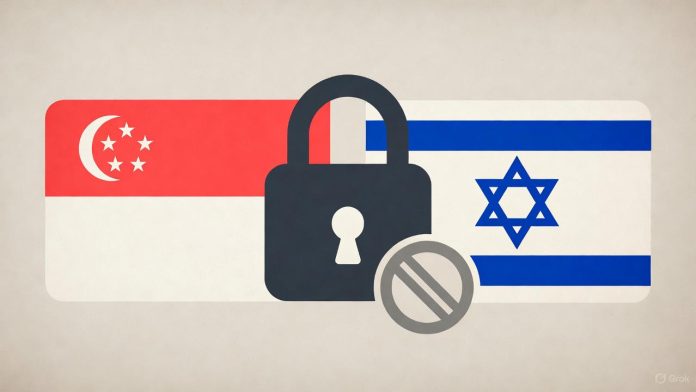Singapore has taken a rare step by imposing targeted sanctions on four Israeli men accused of violent acts in the occupied West Bank. The sanctions, which take effect immediately, apply to Meir Mordechai Ettinger, Elisha Yered, Ben-Zion Gopstein, and Baruch Marzel.
The Ministry of Foreign Affairs (MFA) described the actions linked to them as “egregious acts of extremist violence” against Palestinians. It said these acts were unlawful, harmful, and damaging to hopes for a peaceful two-state solution, which Singapore continues to support.
Such independent sanctions are uncommon for Singapore, making this a significant response to rising settler violence in the West Bank.
Why Singapore decided to act
The MFA restated Singapore’s long-held view that Israeli settlements in the West Bank are illegal under international law and that their expansion makes a two-state solution harder to achieve. It said any attempt to change conditions on the ground through illegal actions cannot be supported.
The ministry noted that violence against Palestinians increases tension, harms affected communities, and threatens stability in the region. It urged the Israeli government to curb settler violence and ensure that those responsible are held accountable.
The sanctions follow earlier comments by Foreign Minister Dr Vivian Balakrishnan, who said in September that Singapore intended to act against leaders of radical right-wing settler groups involved in such violence. He warned then that sanctions were unlikely to change events on the ground but would serve as a clear statement of principle. He also stressed that Singapore does not take the decision to impose sanctions lightly.
Details of the sanctions announced
Under the new measures, Meir Mordechai Ettinger, Elisha Yered, Ben-Zion Gopstein, and Baruch Marzel are now banned from entering Singapore.
Financial sanctions and travel bans are not commonly used by Singapore in issues outside Southeast Asia. Because of this, the decision has drawn international attention.
The ministry said its decision was informed by public reports and diplomatic sources. These reports described serious acts of violence carried out in the West Bank. The MFA called these acts harmful, extreme, and unlawful.
By applying sanctions, Singapore is signalling that it does not want to be connected in any way to violent acts that break international law. The travel and financial restrictions are designed to create clear distance between Singapore and the actions attributed to the four men.
Singapore’s established position on the conflict
Singapore has consistently expressed support for international law as a foundation for global peace and stability. The government has often stated that all countries must follow international rules to avoid escalating tensions.
The MFA repeated that peaceful dialogue is the only way to reach lasting stability in the region. It said the rise in violent settler actions makes it harder to build trust between communities. It added that such acts damage chances for future peace efforts.
Singapore also repeated its support for a two-state solution. This position has remained unchanged for many years. The government believes that two separate states — Israel and Palestine — living side by side is the most realistic path for long-term stability.
The announcement of sanctions highlights concerns about increasing violence in the West Bank. The MFA said that actions that break international law must be addressed directly, even if they are happening far away.
This move shows that Singapore wants to uphold the principles it has always supported. By naming Meir Mordechai Ettinger, Elisha Yered, Ben-Zion Gopstein, and Baruch Marzel, the government is sending a clear message that such behaviour is unacceptable.


